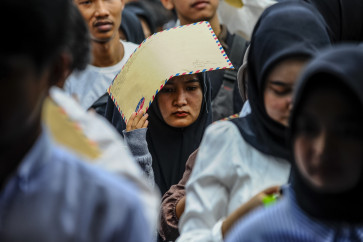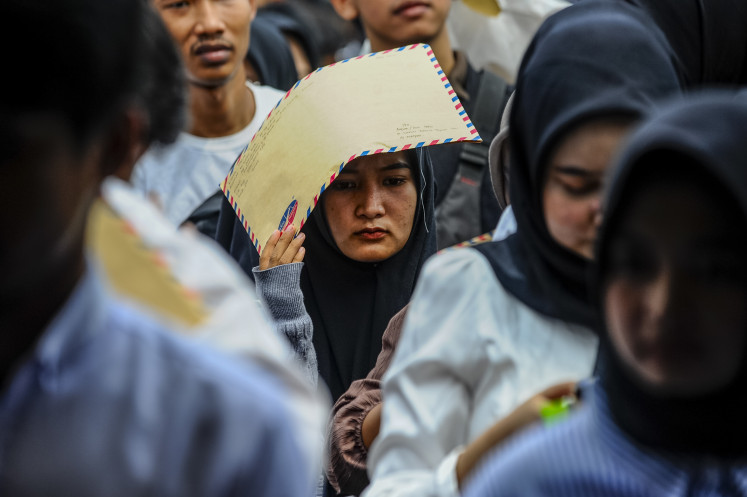Jakarta’s special autonomy
Today we have six pairs of potential candidates slated to contest the Jakarta gubernatorial election scheduled for July 11
Change text size
Gift Premium Articles
to Anyone

T
oday we have six pairs of potential candidates slated to contest the Jakarta gubernatorial election scheduled for July 11.
Although they are not yet eligible, pending the results of verification by the provincial election commission, Jakarta residents have started to hear various promises and plans from the candidates.
Unfortunately, almost all candidates have opted to raise sectoral, micro-issues, although they are important in solving crucial problems of the society.
The candidates should have realized that almost all dimensions of the capital city’s management are systemically related with a greater structural problem. Without considering the macro aspect (governance), the special moment of the regional election will pass by as ordinary, without any strategic solutions on offer.
Jakarta is a special region, hence it enjoys special autonomy. The special status is due to its status as the capital of the country, along with its unique urban dynamics and the city’s development as a megalopolis.
The character and magnitude of issues in Jakarta are not comparable with other regions of the country. In a capital, all government, business/economy and community activities are concentrated, generating very complex issues in the development and management of the city.
Thus, it is appropriate that the special status was given and the management of Jakarta is run on an asymmetric decentralization framework.
Problems stem from the weak description of the special status at the instrumental level. All capital functions, ranging from symbolic to strategic aspects that reflect the national interest, are defined as the tasks of the Jakarta regional government. However, the responsibilities do not come with sufficient basic authority, such as management and arrangement (including asset management).
In fact, as a special region, Jakarta barely has special authorities. The classification of “special” under Law No. 29/2007 on The Special Capital Region of Jakarta (transportation, spatial, etc.) is meaningless since it is essentially similar to the authority of ordinary regions.
The particular reasons why Jakarta’s special status was given are not reflected in the concept of Jakarta’s specialty.
The profile of Jakarta’s special status, in fact, is its institutional design, which is characterized by single autonomy at the provincial level. In other regions, autonomy lies in regency/municipality.
Meanwhile, in Jakarta, autonomy rests at the provincial level, with regency/municipalities left only to deal with administration as a provincial attribute. It is a form of micro-centralized practice, which runs against the mainstream decentralization framework.
Without sufficient autonomy, regency/municipalities in Jakarta cannot work accordingly. They only follow instructions from their superiors, no matter how strong the institutional design of their office.
This form of single autonomy has shut down bureaucratic activities at the basic level. As a result, resolving a clogged sewage network can be a long and winding process as it requires coordination with the provincial government. In the event of flooding, the governor, rather than mayors, becomes the target of the citizens’ anger.
There is a big gap, even disconnection, between the center of power (province) and the center of service (residents). Politically, democracy is stuck at the provincial level: strikes and rallies take place at City Hall, rather than the mayors’ offices, which are considered useless and toothless.
On the other hand, the single autonomy is obviously internally oriented only. Meanwhile, the crucial challenges are more external in nature (inter-region). As a megalopolis, Jakarta has exceeded its jurisdiction in neighboring areas, which by function, are connected to the greater urban area.
Jakarta is increasingly threatened by a lack of space in the wake of demographic pressures, as the home to 9 million inhabitants and workplace of 3 million additional daily commuters. Meanwhile, Jakarta has naturally become dependent on its position in the watershed of the 13 rivers running from Cianjur in West Java.
As the hilly area of Puncak in Cianjur, which has the function to catch and retain water, becomes overrun with private villas that deplete the environment’s rates of water retention, Jakarta will continue to be haunted by floods.
The character and the weight of these issues reflect a “new” demand on Jakarta’s governance. Asymmetric decentralization is worth applying to develop the basic special authorities in managing the capital’s issues.
If this concept remains debatable, the ordinary autonomy model, which is already well known, can be applied. The entry point is the regional autonomy system, where the transfer of authority is conducted according to the real needs of each region.
In transportation, for example, Law No. 29/2007 correctly categorizes transportation issues as Jakarta’s own special matter. However, the contents and scale of authority given to the Jakarta government are no different from those of other regions.
Jakarta’s maddening traffic will be difficult to solve through ordinary channels as the regional government’s authority is restricted to regulations on the use of vehicles only.
No matter how strict the regulation is, or how long new roads are built, the traffic problem will remain unsettled if the production and distribution of vehicles is not restricted.
Thanks to asymmetric decentralization, Jakarta may have special authorities, such as to manage the distribution of vehicles that are allowed to travel in Jakarta. This special authority can be taken from the portion of authority held by the central government.
The same may apply to the inter-regional management. The model of cooperation between regions (KAD) is obviously too conventional for the complexity of problems facing Jakarta, Bogor, Depok, Tangerang, Bekasi and Cianjur (Jabodetabekjur). The model, which assumes the presence of goodwill and region’s awareness among powerful egos in the era of autonomy, has proven ineffective.
Using asymmetric decentralization, Jakarta may have asymmetric relations with its neighbors through the establishment of a government body that holds power to manage inter-regional affairs and coordination without effectively killing autonomy in every region. If the neighboring regions resist the model, the authority body can be reshaped as part of the central government as a regional ministry of Jabodetabekjur, for
example.
Such efforts would obviously have supporters and critics. We are all familiar with the saying: “Behind authority, there is power and money.” However, at least for gubernatorial candidates, the election should provide momentum to produce out-of-the box thinking rather than status quo solutions in dealing with Jakarta’s problems. The candidates may take on one big issue as a program that can be brought to the President if elected.
We need a magnifying glass to read Jakarta, namely a macro-governance optic, which so far, has framed and influenced the failure or success of the management of all sectoral, micro-issues facing the capital.
The writer is manager for external relations at the Regional Autonomy Watch (KPPOD), Jakarta.









